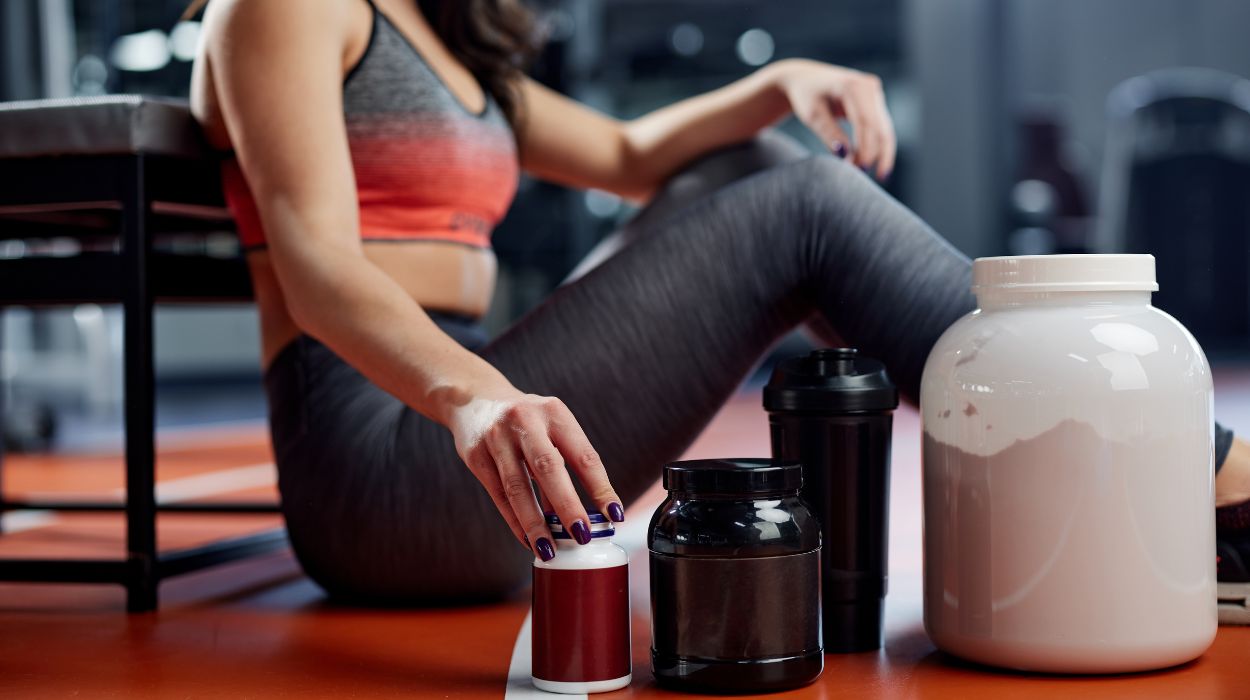Do you sometimes feel lost or confused, wondering what is the best way to lose weight?
Whether it’s the latest fitness fad or the newest supplement that hits the market, it’s common to feel over-saturated with information. Pre-workout is a popular supplement among fitness enthusiasts. But does pre-workout help you lose weight??
The process of losing weight is seemingly simple – your body must burn more calories than it consumes to maintain a calorie deficit. Doing so requires following a balanced, reduced-calorie diet and engaging in physical activity to increase how many calories you burn.
Incorporating a pre-workout supplement into your exercise regimen can aid in reducing fatigue, boosting endurance, and enhancing energy levels for more efficient workouts. The following article delves into recent research findings and explains how the active ingredients in pre-workout supplements can help you reach your fitness goals.
Is Pre Workout Good For Weight Loss?
Pre-workout supplements typically include ingredients like caffeine, beta-alanine, and creatine. These ingredients are believed to boost energy levels, increase mental focus, and improve endurance during training sessions.
While these effects can contribute to a more effective workout, the impact on weight loss is indirect. Incorporating pre-workout supplements can be a helpful tool for those needing more energy to improve their exercise endurance and eventually lead to weight loss.
When individuals engage in more intense and prolonged physical activity, they burn more calories, which can lead to a caloric deficit when combined with a proper diet.
Does Pre-Workout Help You Lose Weight?
The question of whether pre-workout aids in weight loss can vary from person to person because it can have a different effect depending on different individual factors. Answering the question involves an understanding of the physiological effects of these supplements. Although pre-workout does not directly contribute to weight loss, it can help you lose weight indirectly.
So, how do pre-workout drinks help with weight loss?
It’s important to recognize that the primary focus of pre-workout supplements is to enhance exercise performance and endurance, not lose weight. By giving you an extra boost in the gym, you can enhance fat burning and possibly increase muscle mass. Lean muscle mass elevates the resting metabolic rate, leading to more calories burned at rest, playing an essential role in weight management.
How Does Pre-Workout Help You Lose Weight?

Whether trying to get shredded abs or preparing for an upcoming beach vacation, losing weight can be a challenge. For this reason, athletes and fitness enthusiasts are always looking for an extra edge to help them achieve their goals. Remember, you need to be in a caloric deficit to lose weight.
This is where pre-workout supplements can help with weight loss. These supplements often contain ingredients like caffeine, beta-alanine, creatine, and green tea extract, which affect your body differently. They offer benefits like increased energy, reduced appetite, and more. By taking a good pre-workout, you can get the extra push you need to maximize your exercise routine.
Caffeine
A common ingredient in pre-workout formulas is caffeine. The rationale behind incorporating caffeine into these supplements is that it has proven ergogenic effects. This effect means it can enhance athletic performance[1] in a few ways, particularly in endurance-based activities.
First, it can significantly impact the body’s energy metabolism, allowing athletes to exercise for longer durations without experiencing fatigue.[2]
Secondly, caffeine can stimulate the nervous system, leading to increased alertness and focus, which can help athletes push themselves to higher limits during their best workouts.
Another intriguing effect is that the caffeine in pre-workouts can lead to suppressed appetite.[3] When you consume fewer calories on a consistent basis, you can reach the caloric deficit required to lose weight. Therefore, appetite suppression may be an important component of your weight loss plan.
The research has established that caffeine is beneficial, but you may be wondering how much caffeine you should take before your workout.
Dosage
The recommended dosage of caffeine, particularly for exercise performance, varies based on individual factors such as body weight and tolerance. According to research, a commonly suggested range for optimal effects on performance is 3 to 6 milligrams of caffeine[4] per kilogram of body weight.
To calculate your ideal caffeine intake, simply multiply your weight in kilograms by a factor within this range. For example, if you weigh 70 kilograms, your caffeine intake might range from 210 to 420 milligrams.
When choosing a pre-workout formula, it’s advisable to start with the lower end of the spectrum and gradually assess your tolerance before considering a higher dosage. Higher dosages are associated with side effects, such as feeling jittery, tachycardia (increased heart rate), or insomnia (difficulty sleeping).
Beta-Alanine
Beta-alanine is a non-essential amino acid that helps in the production of carnosine. Carnosine is an important compound for muscle endurance during high-intensity activity. Regular use of beta-alanine can significantly increase carnosine levels and enhance power output[5] during exercise.
Beta-alanine is also suggested to improve exercise performance by buffering lactic acid[6] accumulation in the muscles. Lactic acid accumulates in the muscle during intense exercise and leads to muscle fatigue and discomfort. Delaying the onset of fatigue can allow for longer and more intense workouts.
While this can provide more energy during high-intensity exercise, its direct impact on burning fat and muscle growth is minimal.
Creatine
Creatine is one of the most common pre-workout ingredients. Creatine[7] is a naturally occurring compound found in small amounts of certain foods, such as red meat and fish. It is also synthesized within the human body.
Creatine plays a crucial role in producing adenosine triphosphate (ATP), the primary energy source for cells. In the context of pre-workout supplements, creatine has been studied for its potential to enhance performance and the body’s ability to build muscle.
The recommended dosage[8] of creatine for pre-workout supplementation typically ranges from 3 to 5 grams per serving. This dosage is considered effective in increasing muscle creatine stores without causing adverse effects.
Loading phases, where higher doses are taken for a short period, are sometimes recommended. Overall, the consensus is that a consistent daily intake can achieve similar results over time.
One notable benefit of creatine supplementation[9] is its role in improving strength and power during high-intensity, short-duration activities like weight lifting and sprinting. By increasing the availability of ATP, creatine aids in quick energy regeneration. This allows individuals to perform more repetitions or generate more force.
Creatine’s ability to enhance performance is not limited to strength and power activities; it is also a valuable tool in promoting muscle recovery and adaptation. Additionally, creatine may have neuroprotective effects[7] and cognitive benefits and has been shown to assist in the management of:
- Glucose levels and diabetes.
- Heart disease.
- Sarcopenia (an age-related muscle condition causing decreased strength and muscle quality).
- Cancer.
- Cognition.
Side Effects
Concerns regarding creatine and hydration have been raised, but research suggests that creatine does not inherently lead to dehydration. While creatine pulls water into muscle cells, potentially causing a slight increase in water weight, it doesn’t negatively impact overall hydration status.[10] However, it’s vital for individuals taking creatine to maintain adequate fluid intake to support overall hydration.
Green Tea Extract
Another prevalent ingredient in pre-workout powder is green tea extract, which has been linked to boosting metabolism and fat burning.[11] Green tea extract is packed with antioxidants and catechins that can promote thermogenesis. Thermogenesis is how your body generates heat by burning calories, resulting in potential weight loss.
Green tea extract has a mild diuretic effect, which means that it can cause temporary water weight loss. This effect does not directly target fat, but it can lead to minor reductions in weight loss. Additionally, green tea extract can help regulate diabetes by lowering fasting blood glucose.[12] Stable blood sugar levels can reduce cravings and support weight management.
How To Use Pre-Workout To Lose Weight

Recent research suggests that using a multi-ingredient pre-workout supplement[13] (MIPS) is generally safe for short-term use of eight weeks or less. long-term efficacy and safety remain unclear.
Taking a pre-workout supplement 30-60 minutes before exercising is generally recommended. This allows your body enough time to absorb the nutrients from the supplement. This timing aligns with the peak time for caffeine concentration in the bloodstream.
Remember, the response to a stimulant like caffeine or pre-workout may be different for everyone. Considering factors like sensitivity, existing health conditions, and body weight is important before supplement consumption.
It’s advisable to consult with a healthcare professional or a registered dietitian to determine the most suitable caffeine intake based on your specific circumstances. If you’re unsure where to start, here are some suggested pre-workouts for women.
Conclusion
Although pre-workout supplements may provide some benefits, they should be seen as a useful tool to enhance performance rather than a magic solution for losing weight. The foundation for weight loss combines a consistent exercise regimen and a well-balanced diet.
Pre-workout supplements can indirectly aid in fat loss by enhancing exercise performance, increasing energy expenditure, and promoting fat oxidation. These supplements, like protein shakes, can be a valuable addition to a fitness routine, but they should not replace the essential components of a healthy lifestyle.
Frequently Asked Questions
If you are overweight and want to burn fat, start by building healthy foundational habits such as getting enough sleep, staying hydrated, eating a well-balanced diet, and consistently exercising. Then you can consider adding pre-workout to boost your exercise performance.
Pre-workout formulas do not contain active fat burners. Instead, they comprise a combination of beta-alanine, caffeine, and creatine. These ingredients can have an indirect effect on calorie burning by enhancing your exercise performance.
Working out before bed has no additional weight loss benefits. Studies have shown that early exercise sessions[14] promote more weight loss, although the mechanisms remain unclear.
Yes. Pre-workout formulas have different ingredients and calorie contents. It’s important to review the nutrition facts table to determine the calories per serving and ensure it aligns with your goals.
Pre-workout can be a good supplement to reduce the effects of fatigue when it comes to resistance training or long-endurance cardio. Look at a sample workout for a week for ideas on how to plan your routine.
 Expert's opinion
Expert's opinion
